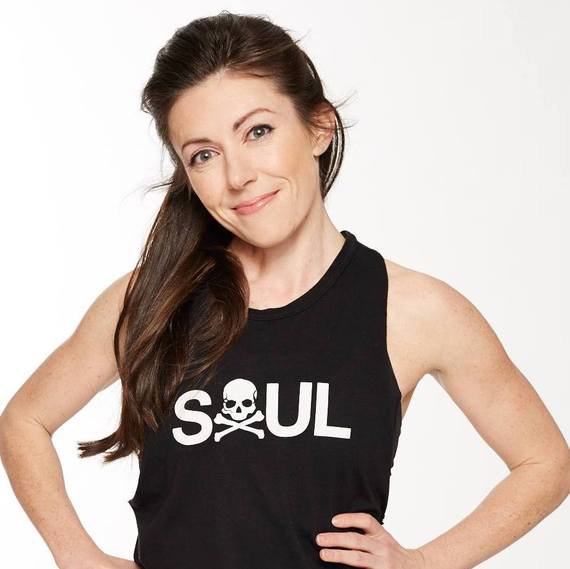Last fall when a girlfriend invited me to join her a SoulCycle, I was skeptical. I had seen women advertising the modern spin class by wearing the SoulCycle workout pants and T-shirts, but I was unsure what made this class so popular, almost cult-like. As someone who shies away from exercise fads, I didn't realize the unique benefits of this class until I tried it.
As I entered the cycling room, it looked more like a meditation space than a workout studio. Unlike the bright lights of many gyms, the room was dark and candlelit. After adjusting the settings on my sunshine yellow bike, I hopped on and clipped my shoes into the pedals. The music began blaring a hip-hop version of Sam Smith's "Stay With Me." Lindy, the instructor, told us to ride to the beat of the music and said, "Don't be afraid to feel something. Reach down and give yourself something by turning up your resistance."
She seemed more like a therapist than a spin instructor.
Lindy's encouraging words reminded me of the sentiments I share with my psychotherapy clients. People often ask me "how" therapy works. Therapy is similar to exercise. While it might feel scary or daunting at first, with practice, it stretches and strengthens our emotional muscles. After beginning SoulCycle, I'm sharing Lindy's mantras with my clients as I explain how the therapeutic journey is similar to a bicycle ride.
Below are some of my favorites from Lindy's class:
"Don't be afraid to feel something."
"Help me get over it..." is a common request shared by my clients. Often, people enter therapy hoping to "avoid" their affect because they're afraid of feeling their emotional heartache.
Just as you need to feel the "burn" in an exercise class to build muscle, therapy works similarly. Even though we may try to avoid our sadness, we often seek therapy because we want someone to witness and help us through our pain. Our feelings communicate important messages that offer clues about how we wish to be treated and received by others. When we pay attention to these signals and reflect upon the meaning they provide for us; we become emotionally sturdier, too.
"The challenge/struggle is where you start to change."
Just like SoulCycle, therapy is hard work. It's not uncommon to feel anxious as you prepare to disclose sensitive details of your life that you may not discuss regularly. In an attempt to avoid this worry, it might be tempting to coast along a session by engaging in small talk about your weekend plans and sharing irrelevant details about your life. But, when you embrace your courage and push yourself to disclose these hard and vulnerable stories, a transformation begins to happen.
"We have to practice being present."
"How long will I be in therapy?" "How long until I am cured?" Many people enter therapy hoping for an immediate outcome without realizing that therapy is a process. Similar to exercise, results from psychotherapy are not instantaneous. When we practice the art of being present in each moment, we begin to perceive life's journey for what it is instead of what we hope it will be. Waking up to our emotional selves in this way often reveals insights that plant novel seeds for self-betterment.
"Go deep."
During my SoulCycle class, I gain more from the exercise when I turn up my resistance. While it's enjoyable to cruise along without feeling my muscles ache, I know this does not contribute to long-term progress. Psychotherapy works similarly. It might feel scary and uncomfortable to delve into your sorrow, but when you give yourself permission to do so, you might be surprised to discover where your emotional journey takes you. Feelings are the heartbeat of our being. They are our emotional receptors that key us into the most important and meaningful aspects of our lives.
"We work harder when we do it together."
Often, new clients enter therapy and believe that because I have a doctorate in psychology, I hold the answers and secrets about how they can improve their lives. However, therapy is not a one-way street with the therapist in the drivers seat. It's an interactive process built on the foundations of a secure client/therapist relationship. Helping clients reach their goals and live their lives more fully entails the collaboration of two minds to uncover patterns that you didn't previously notice.
I wholeheartedly believe in the mind/body connection and the importance of experiencing our emotions and releasing them from our bodies. For me, SoulCycle feels like a form of somatic therapy. During each class as I climb the metaphorical hills, I unleash my gritty emotions instead of keeping them lodged inside my heart. After each class, I feel a renewed sense of meaning and congratulate myself for my hard work.
As you glide into the New Year, you might be surprised to learn how therapy works similarly to your beloved bicycle class and that you can climb the emotional mountain of self-improvement, too.
